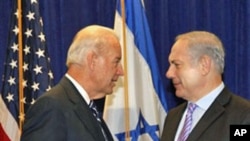The United States and Israel are longtime allies but 2010 saw strained relations between the two governments. U.S. President Barack Obama has made resolving the Israeli-Palestinian conflict a top foreign policy priority. Many in Israel have resented the pressure that the Obama administration is placing on the Jewish state to engage in peace negotiations with the Palestinians.
An anti-U.S. demonstration outside the U.S. Embassy in Tel Aviv in October was a rare sight in a nation where pro-American sentiment is the norm - so much so that some Israelis jokingly refer to their country as America's 51st state.
These protesters were demonstrating against what they perceive as unjust pressure by the Obama administration to freeze construction of Jewish settlements in the Israeli-occupied West Bank.
The U.S. administration sees the expansion of the settlements and continued Israeli construction in parts of East Jerusalem as an impediment to the Palestinians' aspirations for their own state, and to peace efforts.
Israel sees its West Bank settlements as essential to its security.
A low point in relations between the two allies came in March, when Israeli officials announced the approval of construction of hundreds of new Jewish homes in East Jerusalem during a visit by U.S. Vice President Joseph Biden, an action analysts said was embarrassing to the U.S. leadership.
In a speech at Tel Aviv University, Biden condemned the Israeli move, but reaffirmed the strong ties that exist between Washington and the Jewish state.
"Some of you legitimately may be surprised that such a strong supporter of Israel for the last 37 years and beyond, but 37 years as an elected official, how I could speak out so strongly given the ties that I share as well as my country shares with Israel but quite frankly, folks, sometimes only a friend can deliver the hardest truth," he said.
The relationship suffered weeks later when Prime Minister Benjamin Netanyahu visited the White House and received what Israeli newspapers described as a cold welcome by President Obama.
Reports said the U.S. leader snubbed Mr. Netanyahu by leaving him alone with his entourage at the White House and going upstairs to his residence. The two men did not pose for photographers as they usually do.
The raid by Israeli commandos on an aid flotilla that led to the deaths of nine activists off the Gaza Strip in May further strained relations, although Mr. Obama did not publicly condemn Israel.
A thaw was evident in July, when Mr. Obama and Mr. Netanyahu met at the White House, with smiles and handshakes in what observers said was a more conciliatory atmosphere.
Shortly after, the U.S. announced the resumption of direct negotiations between Israelis and Palestinians in Washington on September 2.
The talks stalled within four weeks after Israel refused to extend a self-imposed 10-month building freeze that expired September 26.
Washington has since offered Israel a package of jet fighters and diplomatic guarantees in exchange for concessions on settlements.
The U.S. president has expressed frustration during a trip to Indonesia in November after Israel's decision to build hundreds of new homes in East Jerusalem. The president said that kind of activity is never helpful when it comes to peace negotiations.
Yoram Ettinger is a former minister for congressional affairs at the Israeli Embassy in Washington and a consultant on U.S.-Israel matters. He says there is a fundamental failure by the right-wing government of Mr. Netanyahu and the Obama administration to understand each other. Ettinger says the Obama administration is focusing on the Israeli-Palestinian conflict while Israel is more concerned about the nuclear threat of Iran.
"There are many, many sandstorms in the Middle East threatening American interests, none of which has to do with the Palestinian issue," he said. "Why be preoccupied with such a relatively small issue when there are such dramatic threats to America's well-being?"
Like Israeli and U.S. leaders, Ettinger says the relationship remains, at its core, unshakeable.
He believes the electoral victory of Republicans in the U.S. House of Representatives in 2010 will improve ties in 2011 because Israel will be dealing with a U.S. president who is politically weakened, and a Congress that sees eye-to-eye with Israel on more issues.
"Most of the roughly hundred new house members are more driven by tradition, more driven by security issues, more skeptic and hostile towards the U.N., more skeptic and hostile towards Arab and Muslim regimes, and very, very much anti-terrorism. That bodes very well for enhanced U.S.-Israel strategic cooperation," he said.
In the Jewish quarter of Jerusalem's old city, many Israelis are hesitant to criticize the United States.
This woman says she is cognizant of the billions of dollars in military and other aid that the United States provides Israel each year, and of the fundamental relationship that exists between the two nations.
She says Obama will be followed by someone else. She says Israel has overcome every difficult moment. Israelis, she says, have overcome worse things, and they will overcome this American administration as well.
For her, better relations may come beyond 2011, in 2012, if U.S. voters decide not to give Mr. Obama a second term.




